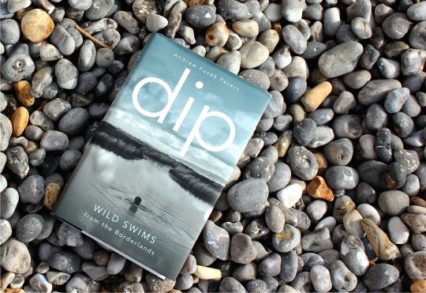256pages, Rider Books, £16.99
 The concept of ‘wild swimming’ – with its trendy modifier – is popular right now. Magazines and newspaper supplements are giving it plenty of space. Andrew Fusek Peters’ Dip: Wild Swims from the Borderlands proves itself an excellent addition to the hobby’s literature. But to simply say that is to do the book a disservice. For Dip‘s greatest strength lies in its hidden depths, which go far beyond water-based adventure.
The concept of ‘wild swimming’ – with its trendy modifier – is popular right now. Magazines and newspaper supplements are giving it plenty of space. Andrew Fusek Peters’ Dip: Wild Swims from the Borderlands proves itself an excellent addition to the hobby’s literature. But to simply say that is to do the book a disservice. For Dip‘s greatest strength lies in its hidden depths, which go far beyond water-based adventure.
In Dip, Fusek Peters recounts a year of plunging into lakes, waterfalls, rivers, streams and tarns. The author’s Shropshire base means he often ventures into Wales to submerge himself in the cold waters of Rhaeadr Du, Rhaeadr Mawddach, River Artro, Nantcol Falls, Pistyll Rhaeadr, Llyn Cau on Cadair Idris and the like. In search of new swimming experiences, he even reaches a rooftop pool in Hong Kong.
Fusek Peters has a wonderfully lucid style. And he knows his nature. This combination means Dip contains beautiful, evocative passages about the author’s travels to swim in untamed landscapes. Certainly, it may well tempt you to join the craze. But the book’s heart reveals itself when Fusek Peters explains why he seeks out these waters. Through the pages of Dip, a picture emerges of a man for whom swimming is a way of attempting to keep the black dog at bay. A way of feeling alive. A way of staying alive.
As Fusek Peters says: ‘the calmness that descends after a wild swim knocks Valium off its frankly dangerous (for me) perch. As ongoing therapy, I recommend cold water.’
You see, Dip‘s year spans a period when Fusek Peters was recovering from a six-month stretch of severe depression, which had seen him hospitalised. Depression meant that Fusek Peters couldn’t leave his house, let alone swim free in nature. His love of wild swimming was taken from him. Water became a foe.
Fusek Peters expertly handles the passages in which he discusses his experiences of depression, alcoholism and drug abuse, which go back decades. He never veers anywhere near self-pity. Nor does he trumpet his ‘recoveries’ from his darkest periods. Dip has a novelistic quality, with the full picture of Fusek Peters’ life slowly emerging through its pages. As do the stories of his family members who have faced their own problems, including Fusek Peters’ own father, who experienced depression, and killed himself.
Fusek Peters has had his own suicidal thoughts. Wild swimming – a wonderful pleasure in its own right – has become a source of energy with which to face the world. Water, that ‘great liquid of life’. The honesty and clarity of Fusek Peters’ writing means that Dip is a deeply-moving and life-affirming book.
A few very minor quibbles. A slight dig at the caravan parks on the coast road near Barmouth is out of keeping with the fair-mindedness of the rest of the book. And it’s tiresome to read yet another writer’s lazy and sweeping criticism when ‘an annoying git’ plays with their phone: ‘we have become addicted to the easy glare of electric.’ And, let’s hope the drug Soma ‘in the novel 1984‘ becomes the drug Soma ‘in the novel Brave New World‘ in later editions.
The greedy may also wish Fusek Peters went into greater detail about his personal demons and those of his family members. But it’d be unfair for a reader to ask for such a personal thing.
Out of style with the rest of the book, Dip‘s penultimate paragraph is a polemic about government funding cuts and the availability of mental health services. It would seem Fusek Peters does have more to say about the place of depression in society. Perhaps, one day, he will write a book explicitly about mental health and society at large, rather than one that’s ostensibly about wild swimming and nature.
Such a book would likely be an even better book – and an even more important book – than the excellent Dip.










